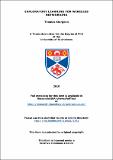Files in this item
Exploratory learning for wireless networking
Item metadata
| dc.contributor.advisor | Allison, Colin | |
| dc.contributor.advisor | Miller, Alan Henry David | |
| dc.contributor.author | Sturgeon, Thomas | |
| dc.coverage.spatial | 199 | en_US |
| dc.date.accessioned | 2011-03-18T10:01:56Z | |
| dc.date.available | 2011-03-18T10:01:56Z | |
| dc.date.issued | 2010-11-30 | |
| dc.identifier | uk.bl.ethos.554186 | |
| dc.identifier.uri | https://hdl.handle.net/10023/1702 | |
| dc.description.abstract | This dissertation highlights the importance of computer networking education and the challenges in engaging and educating students. An exploratory learning approach is discussed with reference to other learning models and taxonomies. It is felt that an exploratory learning approach to wireless networks improves student engagement and perceived educational value. In order to support exploratory learning and improve the effectiveness of computer networking education the WiFi Virtual Laboratory (WiFiVL) has been developed. This framework enables students to access a powerful network simulator without the barrier of learning a specialised systems programming language. The WiFiVL has been designed to provide “anytime anywhere” access to a self-paced or guided exploratory learning environment. The initial framework was designed to enable users to access a network simulator using an HTML form embedded in a web page. Users could construct a scenario wherein multiple wireless nodes were situated. Traffic links between the nodes were also specified using the form interface. The scenario is then translated into a portable format, a URL, and simulated using the WiFiVL framework detailed in this dissertation. The resulting simulation is played back to the user on a web page, via a Flash animation. This initial approach was extended to exploit the greater potential for interaction afforded by a Rich Internet Application (RIA), referred to as WiFiVL II. The dissertation also details the expansion of WiFiVL into the realm of 3-dimensional, immersive, virtual worlds. It is shown how these virtual worlds can be exploited to create an engaging and educational virtual laboratory for wireless networks. Throughout each development the supporting framework has been re-used and has proved capable of supporting multiple interfaces and views. Each of the implementations described in this dissertation has been evaluated with learners in undergraduate and postgraduate degrees at the University of St Andrews. The results validate the efficacy of a virtual laboratory approach for supporting exploratory learning for wireless networks. | en_US |
| dc.language.iso | en | en_US |
| dc.publisher | University of St Andrews | |
| dc.rights | Creative Commons Attribution-NonCommercial-ShareAlike 3.0 Unported | |
| dc.rights.uri | http://creativecommons.org/licenses/by-nc-sa/3.0/ | |
| dc.subject | WiFi | en_US |
| dc.subject | Learning | en_US |
| dc.subject.lcc | TK5105.5S89 | |
| dc.subject.lcsh | Computer networks--Study and teaching | en_US |
| dc.subject.lcsh | Computer networks--Simulation methods | en_US |
| dc.subject.lcsh | Wireless communication systems | en_US |
| dc.subject.lcsh | Virtual reality in education | en_US |
| dc.title | Exploratory learning for wireless networking | en_US |
| dc.type | Thesis | en_US |
| dc.contributor.sponsor | Engineering and Physical Sciences Research Council (EPSRC) | en_US |
| dc.type.qualificationlevel | Doctoral | en_US |
| dc.type.qualificationname | PhD Doctor of Philosophy | en_US |
| dc.publisher.institution | The University of St Andrews | en_US |
This item appears in the following Collection(s)
Except where otherwise noted within the work, this item's licence for re-use is described as Creative Commons Attribution-NonCommercial-ShareAlike 3.0 Unported
Items in the St Andrews Research Repository are protected by copyright, with all rights reserved, unless otherwise indicated.


